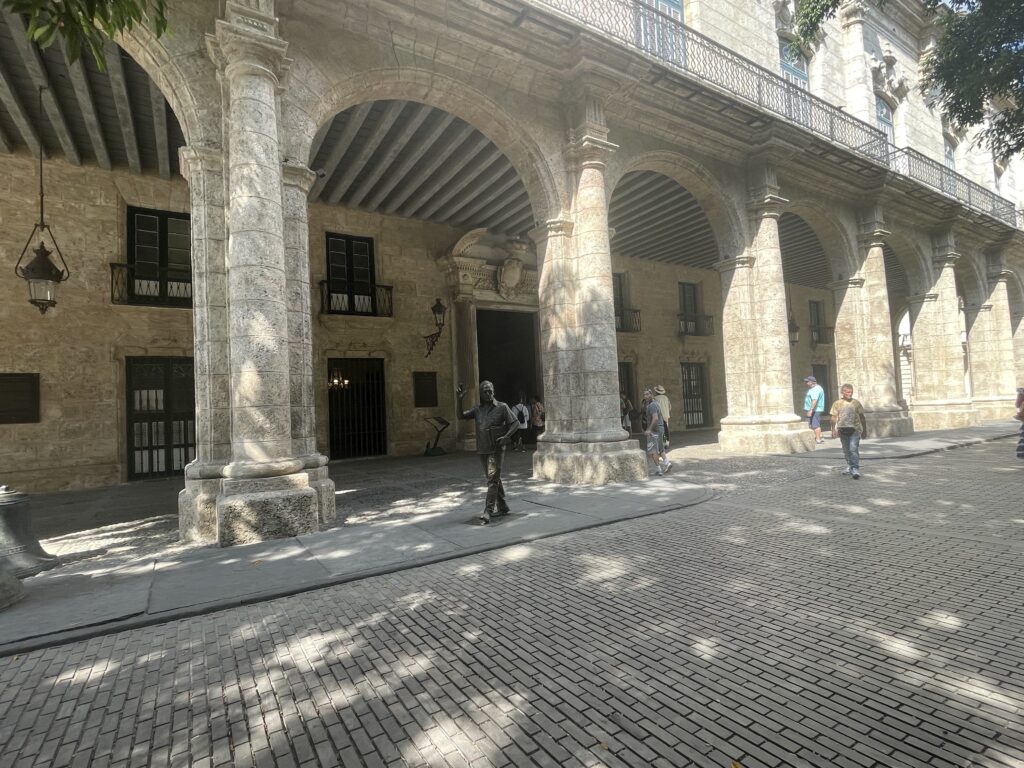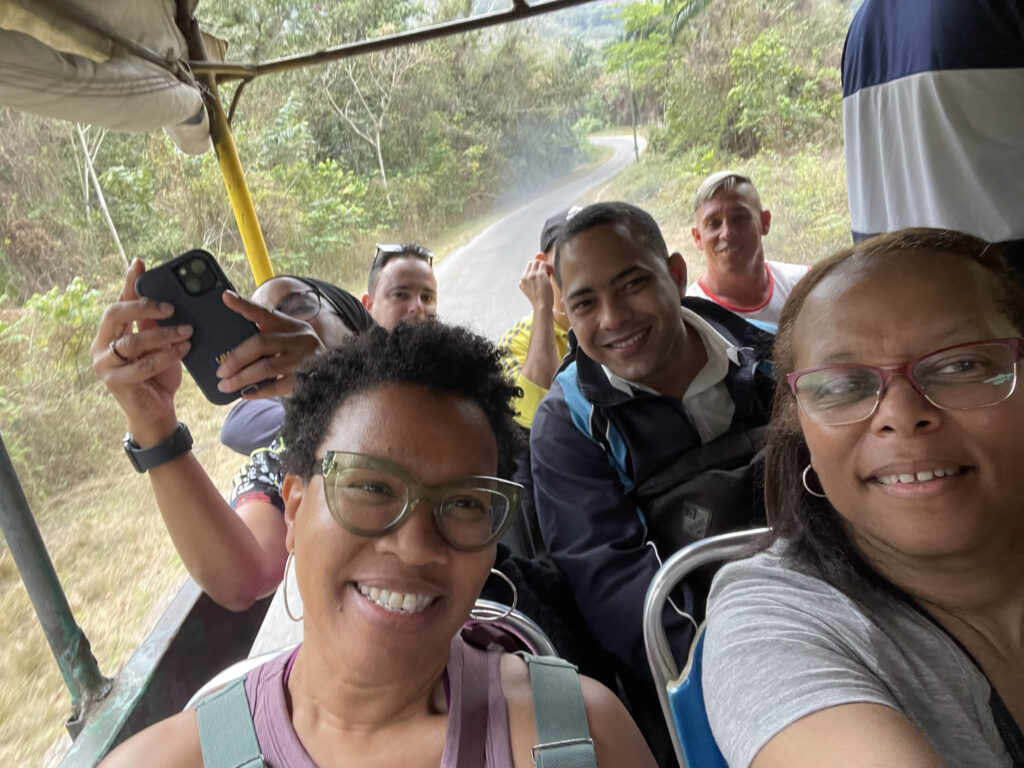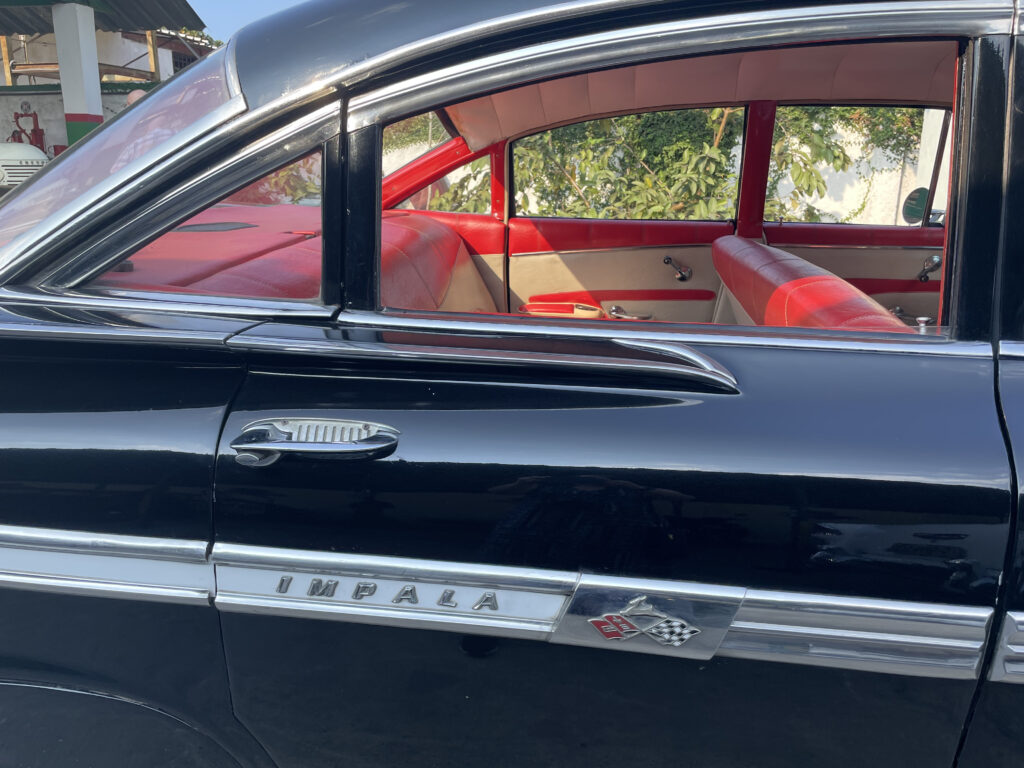By Dr. Erin Bell, Assistant Director of Educational Development
Educators often highlight the importance and benefits of international travel for their students. Given the global nature of the workplace as well as the tenets of the Detroit Mercy mission, study abroad programs can be a significant part of a student experience as they provide numerous benefits to students including expanding their cultural competence and increasing their understanding of global history and the present-day political landscape.
While travel is a valuable experience for students, there are also significant benefits for faculty and administrators who engage in such educational endeavors. Since 2012, Detroit Mercy students, faculty, and staff have traveled to Cuba, and in March 2023, a group of 12 Detroit Mercy travelers comprised of graduate and undergraduate students, faculty, administrators, and their family members visited Old Havana, UNESCO Cultural Heritage Sites, as well as historical locations in the cities of Cienfuegos and Palmira. Led by Lara Wasner, Director of Language and Cultural Training, Study Abroad Coordinator, and Fulbright Student Advisor, the group engaged with city planners and historians, artists, educators, organizational leaders, and other community members, impacting their understanding of Cuba (in its past and present). In 2023, I was fortunate enough to travel to Cuba with our University. The following is based on a conversation between two faculty members who also traveled to Cuba in 2023, Dr. Janet Joiner and Dr. Renady Hightower, and myself, regarding the impact of our experiences on our roles for the University.
Impact on Teaching Practices
For Dr. Joiner and Dr. Hightower, the travel to Cuba in March 2023 transcended the scope of the traditional classroom and expanded their pedagogical perspectives. Dr. Joiner, Assistant Professor of Social Work and Department Chair, found her perspective significantly broadened by the immersive trip. She spoke of the influence the trip could have upon her multicultural understanding course, HUS 4410, and the importance of encouraging students to question the information they encounter inside and outside of the course curriculum. “As a social worker, I know that students come with different experiences, different backgrounds, different ways of being, and different ways of viewing course content. Not having had exposure to Cuba before that and having my experiences come out of an American textbook, my view was very different. Sometimes part of teaching is encouraging students to question what they read, not simply to take what they read as truth and to look for information that might not be as obvious … just because you read it and you’ve been taught it doesn’t make it so; part of how my teaching will evolve in the future is really making that clear to students. I think questioning is what is critical. . . questioning and digging deeper.” As Dr. Joiner continued, “Being immersed in Cuba for that period. . . was transformative. I think when I say transformative, not so much in terms of the way I teach, but the way I view the rest of the world.”
 A scenic view just steps away from the Bay of Pigs. Photo courtesy of Dr. Renady Hightower.
A scenic view just steps away from the Bay of Pigs. Photo courtesy of Dr. Renady Hightower.
Dr. Hightower, Associate Professor in the College of Health Professions, also seeks to instill critical thinking skills in her students, particularly in topics related to culture, bias, and stereotypes. Drawing parallels between her travels in Cuba and the need for evidence-based research, she emphasized the importance of distinguishing fact from fiction, especially in today’s information-saturated world. She recognized that teaching students to question and think critically is essential, even if it means challenging widely held beliefs or scrutinizing politically charged narratives. She noted, “I want students to show me the facts, but I also want them to understand the real story behind what is presented. . . I use my travel experiences in Cuba as a way to instill and to instruct students how to critically think.”
 The trip allowed participants a chance to encounter Cuban history and culture through site visits and experiential learning. Photo courtesy of Dr. Renady Hightower.
The trip allowed participants a chance to encounter Cuban history and culture through site visits and experiential learning. Photo courtesy of Dr. Renady Hightower.
My own experience in Cuba prompted me to revisit my reading lists, seeking ways to make them more inclusive and diverse. At one point in the trip, someone mentioned the Spanish-American War, and our guide asked, “Do you mean the Spanish-American Cuban War?” because Cuba is central to this chapter in our history, and yet political discourse in our country elides this important detail. This was just one component indicative of a larger question regarding historicity and representation. After this, I continue to ask myself how I can make sure that I am not just presenting a one-dimensional view of the world to students or understanding it as such. This also leads me to reflect on how I and others can create more diverse reading lists and a more encompassing curriculum, which in turn, may impact the information I share with faculty in my role for the CETL.
Impact on Research and Scholarship
The trip to Cuba also had a profound impact on the scholarly pursuits of both Dr. Joiner and Dr. Hightower. Dr. Hightower, whose background lies in medical anthropology, used her time in Cuba to reconnect with her discipline’s roots. She spoke of her commitment to understanding the real voice of the people, moving beyond the exploitative and racist ideologies that have historically characterized research in communities of color. Her goal was to observe, listen, and receive the unfiltered narratives of the people she encountered, emphasizing the importance of dispelling preconceived notions about communities. She stated, “You just have to be willing to be open and to hearing and listening and receiving because a lot of times we may observe something but that does not mean we are always listening . . . especially if we have preconceived notions.”
 A group trip to El Nicho allowed for some candid conversations with Cubans. (Dr. Sarida Scott and Dr. Renady Hightower are pictured in front.) Photo Courtesy of Dr. Renady Hightower.
A group trip to El Nicho allowed for some candid conversations with Cubans. (Dr. Sarida Scott and Dr. Renady Hightower are pictured in front.) Photo Courtesy of Dr. Renady Hightower.
Noting the importance of observing and writing about people from their voices and perspectives, Dr. Hightower recalled an instance when she posed a question at a site visit and received a very “official” answer. Later, however, a person in the audience who was not a part of the official presentation provided a more accurate and honest answer. “That is what I am interested in,” explained Dr. Hightower, “getting to the real voice.” For Dr. Hightower, the inclusion of authentic voices always informs her scholarship, which informs her teaching, which always informs her research.
Dr. Joiner, whose scholarly interests also lie in cultural practices, was particularly struck by the spiritual practice of Santeria. She expressed a desire to delve deeper into studying and understanding such practices, acknowledging that the Cuban experience had opened new avenues for exploration within her field. She stated, “If I had the room to move beyond the areas that I now currently explore in social work, I would explore that more.”
The Benefits of Group Travel
Another benefit of this trip was that I traveled with a diverse group of colleagues and students from a range of disciplines. Each participant viewed Cuba through unique lenses, offering insights that were both broad and specialized, which in turn, we shared with the group in debriefing sessions as well as informal conversations at each site visit. The experience facilitated a multidimensional and interdisciplinary perspective, enriching our shared work as educators and researchers. The trip granted me an opportunity to look at the country and the people through different lenses tied to our fields and areas of study. I also appreciated being able to connect with my colleagues and students in such a meaningful way. Some of the informal conversations I had with both faculty and students revealed important information about class structure, teaching practices, and more.
 A bit of Detroit history we encountered in Cuba. This Impala was one of many pristine vehicles the group was able to enjoy on a tour through Havana. Photo Courtesy of Dr. Renady Hightower.
A bit of Detroit history we encountered in Cuba. This Impala was one of many pristine vehicles the group was able to enjoy on a tour through Havana. Photo Courtesy of Dr. Renady Hightower.
Dr. Hightower also emphasized the value of traveling in a group, not only for safety but also for the opportunity to mentor and learn from students. She found that students brought fresh and insightful perspectives to the experiences, enriching the group and expanding everyone’s understanding. She stated, “Students have some really positive, wonderful, great insight and experience with bringing that what they read and reflecting or revealing that they were making those connections. I like the group dynamics because you never know what you are going to hear, see, or experience.”
Advice for Future Travelers
When asked about advice for fellow faculty considering University-sponsored travel, Dr. Joiner and Dr. Hightower both underscored the significance of stepping outside one’s comfort zone. Dr. Joiner encouraged her colleagues to embrace the opportunity to experience life from different cultural perspectives, emphasizing that personal growth often occurs when we venture beyond our familiar surroundings. She stated, “This trip allowed me to be able to do that, to not have the creature comforts that I have become accustomed to. I was able to think about how others outside of the U.S. experience life, and sometimes it can be difficult for us to take a step outside our limits and see how the rest of the world lives because we are only focused on ourselves.”
Dr. Hightower echoed this sentiment, urging individuals to explore the world beyond their immediate surroundings, recognizing the profound impact it can have on one’s teaching, research, and overall perspective. She stated, “All you know is your city, your state, or your country. I am not saying we do not want to know that because there are so many beautiful places here in the United States, that we have yet to visit, but it is narrow when you cannot step outside and go visit another place that is far away, that is not within your national borders.”